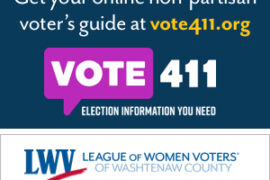When Bridge Magazine made a stop at the Dexter Forum this past May, they shared some tips for spotting fake news.
Fake news is deliberate misinformation spread through news outlets and social media. The intent is to mislead an audience in order to discredit an entity or person and/or gain financially or politically. The headlines are often sensational, dishonest, or fabricated in order to increase online reading and other engagement such as sharing which increase advertising revenue. Fake news differs from satire which is intended to entertain rather than mislead.
The problem for us with fake news is that at first glance it often looks just like real news. It’s easy to get sucked in. There’s a curious headline, or a headline with loaded language intended to evoke an emotional response, and before you know it we click the link. Fake news wins.
As long as there has been people relying upon news reports, there have been fake reports.
- In the 13th century BCE, Rameses the Great spread fake news portraying the Battle of Kadesh as a great victory for the Egyptians, with scenes of himself valiantly defeating his foes. The treaty between the two sides shows the battle was a draw.
- During the 1st century BCE, Marc Antony killed himself after his defeat at the Battle of Actium when he heard false reports, propagated by Cleopatra herself, claiming she had committed suicide.
- In order to build support for the Revolutionary War, none other than Ben Franklin himself published fake news reports of Native Americans being paid by King George IV to scalp colonists.
- In 1835, The New York Sun published a series of articles about a real-life astronomer who had observed life on the moon. New subscriptions soared.
- In the 1890s, untrue stories about Spaniards in Cuba whipped up support for the Spanish-American War.
With the internet explosion, fake news has become easy to create and lucrative. Jestin Coler, former CEO of the fake media conglomerate Disinfomedia, told NPR that his company employed up to 25 writers and he earned $10,000 to $30,000 a month from advertisements.
It gets more complicated. Since the 2016 elections, “fake news” has also become a label by which to discredit any report not favorable or simply disliked even though the news may be true. So how do we know? How do we filter out what is true and what is false?
Here are a few tips from Bridge Magazine for spotting fake news:
- Read more than the headline. Clickbait titles can misrepresent the facts or situation, misleading you.
- Check your biases. Ask yourself: do I believe the story because it confirms my worldview?
- Consider the publication. Read the about page. Are they a blog or a professional outlet? What is their mission?
- Research the author. Do they have experience that would give them an informed viewpoint?
- Click the links. Click on hyperlinks in the story to check if their initial sources are trustworthy.
- Is anybody else reporting it? Large stories are picked up by multiple outlets. If nobody else is reporting, it may not be real.
- Is it a joke? Stories posted on satirical websites can be mistaken for actual stories.
- Examine the URL. Fake news sites may use URLs that closely resemble actual sources to trick you. For example: ABCNews.com (real), ABCNews.com.co(fake).
Bridge Magazine is the publication of The Center for Michigan, a non-profit, non-partisan organization founded by Michigan media mogul Phil Power in 2006 to engage Michigan residents statewide in pertinent political issues and concerns. “Bridge” in the publication’s title refers to the Center’s vigilant efforts to engage people in a reality beyond partisan ideologies, labels, and prejudices.
The Center for Michigan is a great resource for fact-checking Michigan’s candidates and issues of public concern. You can find their in-depth news and analysis on their website at https://www.bridgemi.com/








